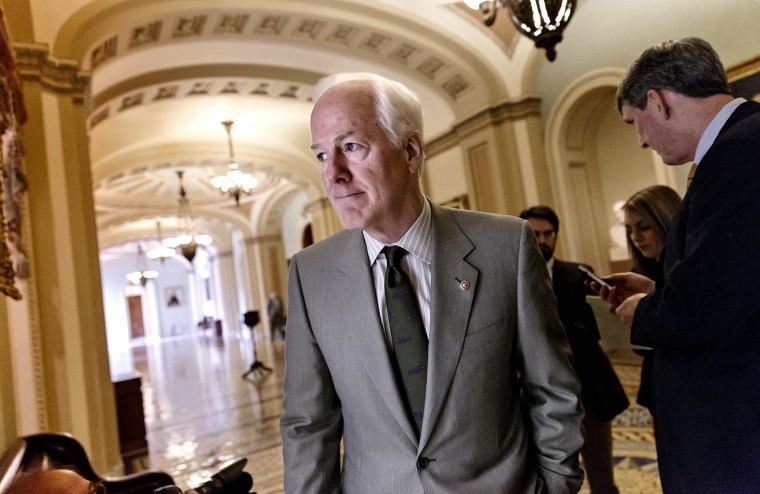Senate Majority Whip John Cornyn (R-Texas), the #2 Republican in the Senate leadership, raised a familiar concern yesterday, complaining about the Obama administration's reluctance to use the phrase "war on terror."
When it comes to combating terrorist attacks, Sen. John Cornyn (R-Texas) said the Obama administration needs to call its efforts what they are – a war on terror. When asked by host Bob Schieffer on CBS's "Face the Nation" if the U.S. is still engaged in a war on terror, Cornyn said it is, but the administration has a tendency to try to be politically correct.
"I do think there is a tendency toward political correctness on the part of the administration," the Republican senator argued. "We know that, for example, when Major Nidal Hasan made his attack at Fort Hood, they called that 'workplace violence.' And they are calling the war on terror 'overseas contingency operations.' We need to call it what it is, because that's the first step to actually dealing with it on a realistic basis."
Actually, it's not. Word choice is not the first step towards addressing a national security threat. But over the last week, it's nevertheless been a preoccupation for many on the right.
For example, within hours of the initial attack last week in Paris, Senate Judiciary Committee Chairman Chuck Grassley (R-Iowa) turned to Twitter to chide President Obama over the phrase "war on terror."
Soon after, Sen. Richard Burr (R-N.C.), the new chairman of the Senate Intelligence Committee, said his "only concern" is the "language" Obama uses -- and the North Carolina Republican expressed related concerns yesterday.
Let's make a couple of things straight. First, it's well past time for Republicans to get over this. The Obama administration decided early on, six years ago, that the "war on terror" phrase had outlived its usefulness. It was a deliberate, strategic move -- Anthony Cordesman, a national security analyst at the Center for Strategic and International Studies, explained at the time that the "war on terror" has "became associated in the minds of many people outside the Unites States and particularly in places where the countries are largely Islamic and Arab, as being anti-Islam and anti-Arab."
The shift was hardly shocking. In 2007, the year before Obama's election, Adm. Michael Mullen, the then-chairman of the Joint Chiefs of Staff, banned use of the phrase "Global War on Terror." The year before, then-Defense Secertary Donald Rumsfeld also rejected the phrase, conceding, "[I]t is not a 'war on terror.'"
In 2008, the Republican chairman of the House Intelligence Committee agreed that the phrase "war on terror" is the "dumbest term ... you could use".
Second, it's striking that concern over word choice has risen to the top of the GOP's talking points. Cornyn, Grassley, and Burr had very little to say about the Obama administration's military offensive against ISIS, its successful strikes against al Qaeda, and the attacks administration officials have thwarted, focusing instead on their rhetorical dissatisfaction.
Indeed, for many of these Republicans, it's as if we're stuck in an inane debate from several years ago, and GOP arguments have become more reflexive than substantive -- if there's terrorist violence, the partisan id demands complaints about phrasing.
Our political discourse really should be smarter than this.
